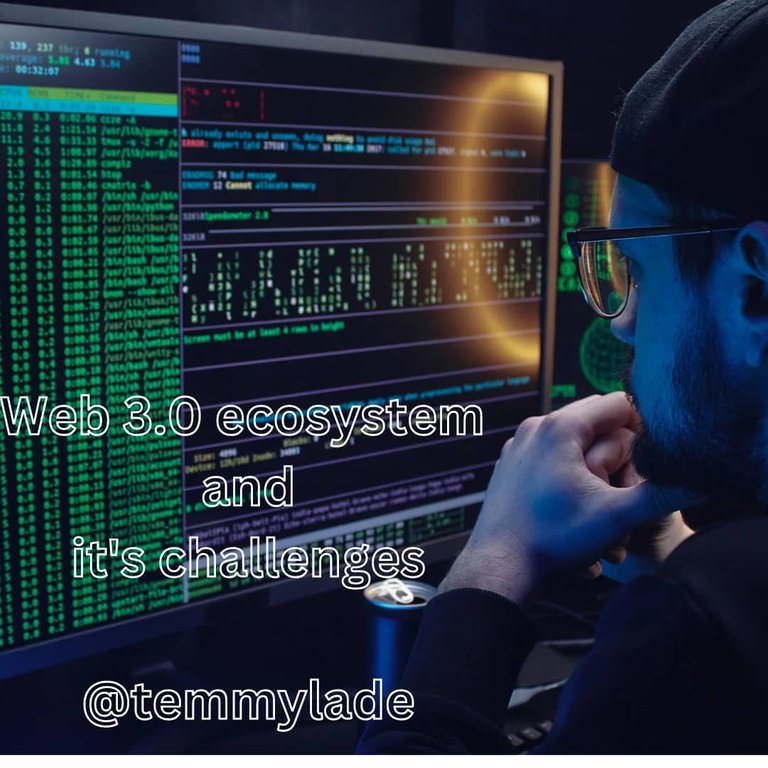Web 3.0 ecosystem and its challenges
A future internet generation called web 3.0 claims to be more private, safe, and decentralised than the present web. Web 3.0, which is being developed on top of blockchain technology, will enable direct user-to-user communication and interaction with decentralised apps (dApps). Although web 3.0 is still in its infancy, it has the potential to completely change how we interact with the internet.

Image designed on canva
The world wide webs third generation, known as web 3.0, is built on decentralised technologies.
There is no question that web 3.0 is the internet's next generation and that it will completely change how we use it. Before web 3.0 to take off, there are a few obstacles that must be solved.
1. Protection:
To safeguard user data and information, web 3.0 must be sufficiently secure.
2.Utilizability:
Web 3.0 must be simple to use for regular users.
3. Interoperation:
Web 3.0 must be compatible with a variety of platforms and operating systems.
4. Ability to scale:
If web 3.0 is to be widely utilized by everyone, it must be able to manage enormous volumes of data and transactions.
5. Sustainability:
Long-term viability is required for web 3.0
These are only a handful of the difficulties web 3.0 must overcome. But if it succeeds, it might fundamentally alter how we use the internet going forward.
There is a lot of discussion about web 3.0 because of how prominent cryptocurrency and blockchain technologies are becoming.
BENEFITS OF WEB 3.0
1. Privacy-oriented:
web 3.0 also has the benefit of being privacy-focused. This implies that consumers have the option of maintaining their anonymity. This contrasts with the conventional web, which is frequently quite intrusive and gathers a lot of private information.
2. Unalterable:
The immutability of web 3.0 is another benefit. This implies that something cannot be modified once it has been published on the web 3.0. In comparison, the conventional web is frequently quite simple to manage.
3. Decentralisation:
The decentralised nature of web 3.0 is one of its key benefits. This indicates that there isn't a single entity in charge of it. This contrasts with the conventional web, which is governed by centralised entities like governments and businesses.
4. Resistance to censorship:
Web 3.0 has the additional benefit of being censorship-resistance. This implies that content uploaded online cannot be censored or controlled by anyone. This contrasts with the conventional web, which is frequently censored by organizations and governments.
5. Compatibility:
The interoperability of web 3.0 is another benefit. This implies that various applications can communicate with one another. This contrasts with the conventional web, which is frequently fragmented and challenging to integrate.
Posted Using LeoFinance Beta
https://twitter.com/1258315484233117696/status/1610008995284094977
The rewards earned on this comment will go directly to the people sharing the post on Twitter as long as they are registered with @poshtoken. Sign up at https://hiveposh.com.
Hive is the Way. For the web 3.0 dApps to be as beneficial as possible, they need to be built on a Layer 1 blockchain that is also decentralized. You're only as good as your weakest link.
Posted Using LeoFinance Beta
More reason I am learning to acquire more knowledge and also improve on my writing skills.
Posted Using LeoFinance Beta
Inclusion is also needed. As long as web3 is very technical and complicated, it will take longer to use it in everyday life. It seems that it is part of our responsibility to educate people about blockchain and web3 even if we gain nothing in return. Good post! Blessings✌️
Sure, you are right.
Educating people to stay informed is really important.
Thank you so much for your kind words 😊
Posted Using LeoFinance Beta